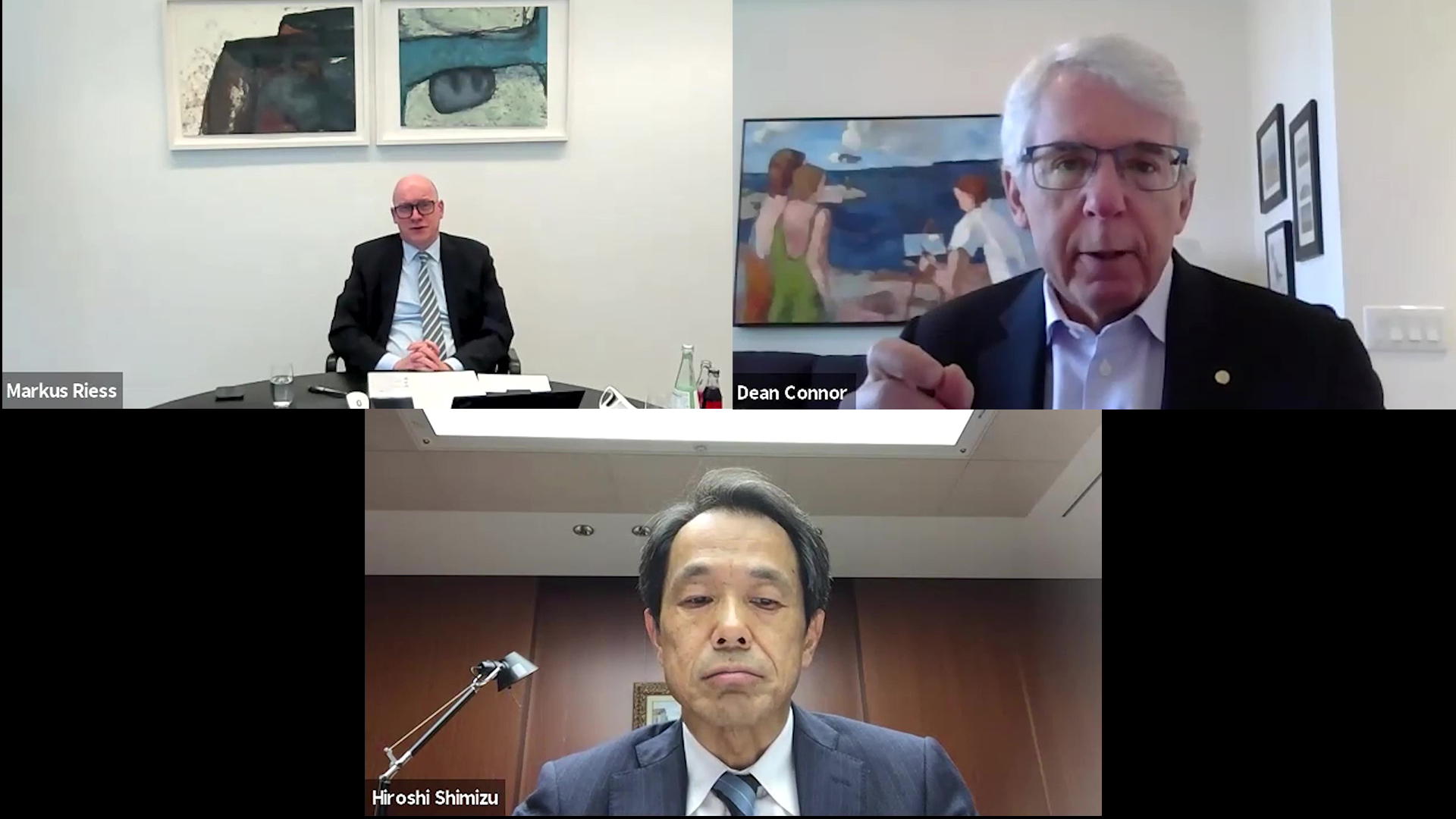Re-imagining Insurance in the Post-Pandemic World
As an industry, insurers immediately responded to the constraints of the pandemic, including pivoting to remote work and continuing to fulfull promises to customers. The sector also proved resilient financially, particularly compared to the 2008 financial crisis. However, though the pandemic revealed opportunities for the industry to reassert its value proposition in supporting society, it also made it clear that insurers alone cannot protect against systemic risks like pandemics.
The world is now beginning to emerge from the COVID-19 pandemic, and businesses are adapting once again. The 2021 Geneva Association CEO Forum was a place for global insurance leaders to exchange views on the changes underway and how the risk landscape and the insurance industry will be affected over the long term, examining both challenges and opportunities.
The following is a summary of the discussions that took place at the Geneva Association CEO Forum, held virtually on 27 May 2021.
Keynote speech: The world economy in 2021 and beyond

Jean-Claude Trichet, formerly President of the European Central Bank (2003–2011) and Governor of the Banque de France (1993–2003).
Though the extraordinary response of governments, central banks and the private sector avoided the onset of a major economic depression on the back of the COVID-19 pandemic, we experienced the worst recession since World War II.
In his keynote speech, Jean-Claude Trichet expounded the current economic situation and where we are now in terms of recovery, as well as the long-term challenges facing the global economy.
Where are we now?
The rollout of vaccination programmes in advanced economies has had a significant effect on growth rates so far in 2021. The U.S., where vaccines were distributed extremely efficiently, has shown impressive and accelerating growth. The same has been seen in the EU, though to a far lesser extent than in the U.S., reflecting a slower rollout of vaccines. The outlook is less optimistic for advanced economies with poor vaccination rates, such as Japan, which has shown slight economic contraction.
The situation changes considerably when we look at emerging economies, where the loss of GDP per capita has been far greater than in advanced economies. China is the exception, where economic growth has been extraordinarily rapid, outpacing even that of the U.S.
The longer-term perspective
There are five main challenges as we look ahead:
- Increasing public debt. Huge fiscal stimulus packages have been essential in propping up economies and providing relief to those affected by the pandemic. Public debt cannot continue to pile up eternally, however, and must be tackled sooner or later.
- Balance sheets of central banks are more stretched than ever before. Continuing on this trajectory is not sustainable in the long run. If not corrected, we may get on the path towards a new financial crisis.
- Preservation of global public goods. Countering environmental degradation and climate change is of the essence. The pandemic has also been a formidable wake-up call on the importance of global public health.
- Acceleration of advancements in science and technology. Though this offers many opportunities, including for insurers, it also comes with formidable risks, most notably around cybersecurity.
- The need for social cohesion. Balancing economic agility with the need to correct and prevent further widening of social inequalities will be an extremely important, though difficult, task.
Panel 1: Insurance in the post-pandemic global risk landscape

(Top) John Neal, CEO, Lloyd’s of London; Brian Duperreault, Executive Chair of the Board, AIG. (Bottom) David Knibbe, CEO & Chairman of the Executive Board, NN Group.
“The crisis is challenging us to think very, very differently about different types of risks and to recapture a state of innovation in the way in which we imagine and represent products and services. At our heart, we have a social core in insurance, in both life and non-life, so I think we have a great opportunity to step in and represent our value proposition.”
John Neal, CEO, Lloyd’s of London
Though the crisis of the pandemic is far from over, we can identify a number of trends that will have particular relevance for insurance. That said, most shifts did not begin with COVID-19 but rather were accelerated by it.
Companies are acclimating to a permanent increase in remote work. They should anticipate differing employee preferences and have policies that are not unfairly punitive. The purpose of the physical office will change. Spaces should be conducive to people meeting and interacting. Despite the successes of remote work, in-person exchanges can be more efficient and satisfy human social needs at the same time.
Digitalisation has clearly transformed businesses. An additional feature has been the surge in the use of cryptocurrencies, particularly by young people, which raises the question of their acceptability by insurers.
The insurance sector has a role to play in promoting a green recovery and sustainability. Companies are increasingly taking action against climate change through their investment and underwriting practices, but there are still pulls from shareholders with different priorities.
Before the pandemic fades from memory, insurers should engage with governments and other public stakeholders to build better channels for sharing risk information and considering innovative risk transfer solutions. Strengthening resilience needs to be prioritised. Governments will have an increasing role to play in preparing for and managing systemic risks, whether pandemic, cyber, or climate-related. However, there are challenges for insurers in cooperating with governments; public-sector decision makers do not have a professional framework for risk management. The industry must still invest in building collaboration and trust with governments to bring positive results for society.
Panel 2: Impact of the pandemic on business strategies of insurers

(Top) Markus Riess, CEO, ERGO; Dean Connor, CEO, Sun Life Financial. (Bottom) Hiroshi Shimizu, President, Nippon Life.
Many changes have been in evidence in the insurance sector over the past year. This discussion looked at the extent to which these are related to COVID-19, and how the pandemic might impact insurers’ business models going forward.
The pandemic has clearly accelerated the creation, deployment and adoption of digital tools in insurance. This has allowed insurers to expand access to services as well as accelerate underwriting and create services that are more personal, predictive and proactive, for example around mental health. Customers will expect all of this to continue post-pandemic.
The insurance business, however, remains largely advice driven. The way insurers interact with their customers and transport this advice will change post-pandemic, with less emphasis on physical presence. Face-to-face interactions are not expected to disappear completely though. Multi-channel business models will be essential to meet the needs of customers as they journey through different stages of life.
“We are fully committed to guaranteeing personal support in a digital environment, via digital means. We will not give up on our advice base but we will digitally enhance and enable it at all touchpoints.”
Markus Riess, CEO, ERGO
Insurers must also pursue opportunities brought about by the pandemic to create a better world. First, a heightened awareness of the need for protection and prevention will increase demand for insurance. The provision of prevention services will be particularly important in the face of ageing societies and the rise of non-communicable diseases. Second, as institutional investors, insurers also have the power to make a significant contribution to realising a sustainable society. They must take more social responsibility post-pandemic by encouraging companies to take concrete actions to tackle global issues such as climate change and by addressing and providing solutions to social problems such as financial exclusion and social inequality.
COVID-19 has increased awareness of what insurers do, which gives us reason to be optimistic. At the same time, however, customer expectations have risen. As we enter the post-pandemic world, insurers will need to ensure that they are able to capitalise on newly created opportunities while meeting the growing needs of customers and society at large.






